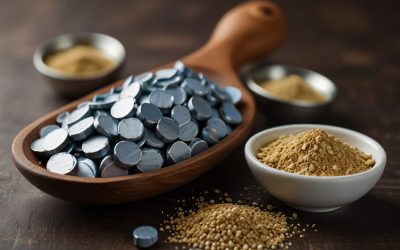As you navigate the choppy waters of chronic inflammation, you may find yourself searching for a beacon of hope that doesn’t come in a prescription bottle. It’s clear that what you put on your plate can serve as a powerful tool in quelling the flames of inflammation, but there’s more to the story than just food choices. You’ve likely heard that certain lifestyle adjustments can help, yet the sheer volume of advice out there can be overwhelming. To steer you toward calmer seas, we’ll explore the natural avenues proven to reduce inflammation—ranging from the anti-inflammatory foods that deserve a regular spot in your kitchen, to the lifestyle habits that need tweaking. What you may not expect are some of the surprising items that could be quietly fueling the fire inside you, and the simple swaps that can make a profound difference. Stay with us as we unfold the layers of this complex topic, equipping you with actionable strategies to take control of your inflammation and, ultimately, your health.
Key Takeaways
- Incorporate whole, nutrient-dense foods into your diet to reduce inflammation.
- Increase your intake of omega-3 fatty acids through sources like fatty fish, flaxseeds, and walnuts.
- Consider adding herbal supplements like turmeric, ginger, and green tea to naturally combat inflammation.
- Take a holistic approach to wellness by focusing on overall lifestyle habits such as exercise, stress management, and adequate sleep.
Identify Inflammatory Foods

To combat inflammation effectively, it’s crucial to identify and limit foods known to trigger an inflammatory response, such as refined carbs and sugar-laden drinks. These culprits, often found in white bread and other processed snacks, are not just empty calories; they can prompt a harmful reaction in your body, potentially leading to chronic diseases like type 2 diabetes and heart disease.
When you’re serving others, particularly in a caregiving or nutritional advisory role, it’s important to guide them towards whole grains instead of refined grains. Whole grains are packed with nutrients and fiber, which can help dampen inflammation. Additionally, reducing the intake of red meat, which is associated with increased inflammation, can also be beneficial. Encourage the inclusion of anti-inflammatory foods such as tomatoes, rich in lycopene, and nuts like almonds and walnuts, which contain healthy fats.
Fatty fish, another powerful anti-inflammatory food, is high in omega-3 fatty acids, known for reducing inflammation. Olive oil, a staple in the anti-inflammatory Mediterranean diet, is another excellent choice for cooking and dressings. Green leafy vegetables, such as spinach and kale, are loaded with antioxidants and polyphenols, protective compounds that play a role in decreasing inflammation.
Embrace Anti-Inflammatory Diet
By choosing an anti-inflammatory diet, you’re taking a powerful step toward reducing inflammation and protecting your health from chronic diseases. This approach to eating focuses on whole, nutrient-dense foods that naturally combat inflammation. It’s not just about what you avoid, but also what you embrace.
Incorporate a variety of fruits and vegetables into your meals. These foods are rich in antioxidants and phytonutrients that can help calm inflammation. Opt for colorful options like berries, kale, and sweet potatoes, which are especially high in these beneficial compounds. Adding olive oil as your primary fat source can also make a significant difference. Rich in monounsaturated fats and polyphenols, olive oil has been shown to have anti-inflammatory properties.
Embracing the Mediterranean diet is a practical and delicious way to adopt an anti-inflammatory lifestyle. This diet includes plenty of fruits and vegetables, whole grains, legumes, nuts, and seeds, along with a healthy intake of fatty fish like salmon and mackerel. These fish are high in omega-3 fatty acids, which are known for their anti-inflammatory effects.
Remember to include nuts such as almonds and walnuts in your snacks or meals. These are not only heart-healthy but also provide essential anti-inflammatory fats.
Incorporate Omega-3 Fatty Acids

Incorporating omega-3 fatty acids into your diet, through sources like fatty fish, flaxseeds, and walnuts, can significantly diminish inflammation and enhance your overall health. These nutrients are key players in the fight against chronic inflammation, a persistent condition that’s linked to a host of health issues, including heart disease and arthritis.
Omega-3 fatty acids are renowned for their anti-inflammatory effects. Fatty fish, such as salmon and sardines, are among the richest sources. Aim to serve these types of fish a couple of times a week to ensure you’re getting a potent dose of omega-3s. If you’re vegetarian or simply not a fan of fish, don’t worry—plants have got your back. Flaxseeds, chia seeds, and walnuts are excellent plant-based alternatives that you can easily incorporate into your meals. Sprinkle them over your morning oatmeal or blend them into smoothies for a healthful twist.
Balancing your omega-6 to omega-3 fatty acid ratio is also crucial for managing inflammation. The modern diet tends to be heavy on omega-6s, which are found in many processed foods and vegetable oils. By upping your omega-3 intake, you help restore this balance, effectively reducing inflammation.
For some, consuming enough omega-3s through diet alone can be a challenge. This is where fish oil supplements come into play. They can be an effective way to increase your omega-3 fatty acid intake. Remember, it’s always best to consult with a healthcare provider before starting any new supplement regimen.
Enhance With Herbal Supplements
Mother Nature’s medicine cabinet offers herbal supplements like turmeric, ginger, and green tea, each packed with compounds that combat inflammation naturally and effectively. Turmeric, known for its vibrant yellow hue, contains curcumin—a substance with powerful anti-inflammatory effects that can reduce markers of inflammation and may help prevent chronic inflammation. To maximize its benefits, you might want to pair it with black pepper, which enhances curcumin absorption.
Ginger, another potent herb, is not just for flavoring dishes. It’s a staple in natural health practices for its ability to reduce inflammation. Especially if you’re dealing with osteoarthritis or muscle pain, incorporating ginger into your diet or taking it as a supplement could offer relief.
Then there’s green tea, a soothing beverage that doubles as a protective agent against inflammation. Its polyphenols, especially epigallocatechin gallate (EGCG), are known to have anti-inflammatory properties that can protect against inflammation and potentially lower the risk of some chronic diseases.
Here’s a simple table to help you remember the benefits of these herbal supplements:
| Herb | Active Compound | Potential Benefit |
|---|---|---|
| Turmeric | Curcumin | Reduces markers of inflammation |
| Ginger | Gingerol | Helps with muscle pain and osteoarthritis |
| Green Tea | Polyphenols (EGCG) | May prevent chronic inflammation |
Incorporate these supplements into your routine as part of a holistic approach to wellness. Remember that while these herbs can support your health, they’re most effective when combined with a balanced diet and healthy lifestyle. Always consult with a healthcare professional before starting any new supplement, particularly if you have existing health conditions or are taking other medications.
Prioritize Regular Exercise

To effectively combat inflammation and lower your risk of chronic diseases, make regular exercise a cornerstone of your daily routine, aiming for at least 30 minutes of activity five days a week. Regular exercise not only helps manage weight and reduces the risk of chronic conditions like heart disease and diabetes, but it also supports your immune system in functioning optimally.
Here’s how you can prioritize regular exercise to keep inflammation at bay:
- Choose activities you love: The more you enjoy your exercise, the more likely you are to stick with it. Whether it’s brisk walking, swimming, cycling, or dancing, find a form of movement that brings you joy and invigorates your spirit as you serve your body’s needs.
- Mix it up with cardio and strength: Aim to include both cardiovascular workouts, which improve heart health, and strength training exercises, which build muscle and support joint health, in your routine. This combination ensures you’re addressing multiple aspects of physical fitness and inflammation control.
- Be consistent: Consistency is crucial when it comes to exercise and its anti-inflammatory effects. Set a schedule that’s realistic for you, and commit to it as you would any important appointment. Remember, you’re investing in the long-term well-being of yourself and those you care for.
- Start slow and build up: If you’re new to exercise, begin with gentle activities and gradually increase intensity and duration. This approach helps prevent injury and ensures a sustainable transition into a more active lifestyle.
Focus on Weight Management
Maintaining a healthy weight plays a pivotal role in reducing inflammation and safeguarding against chronic health conditions. Excess body fat, especially around the abdomen, can promote inflammation and increase your risk for diseases such as diabetes, heart disease, and certain cancers. It’s not just about the numbers on the scale, but also the balance of nutrients that you consume and the lifestyle you lead.
To manage your weight effectively, it’s crucial to prioritize a balanced and nutritious diet that’s rich in whole foods. Focus on incorporating a variety of fruits, vegetables, whole grains, lean proteins, and healthy fats into your meals. These foods are not only nutrient-dense but also have anti-inflammatory properties that can help fight chronic inflammation.
Exercise is a powerful tool for weight management and inflammation reduction. You’ve got to make regular physical activity a staple in your routine. This doesn’t mean you have to spend hours at the gym; even daily brisk walks or other moderate activities can make a significant difference.
Being mindful of portion sizes and practicing mindful eating are also key strategies. Pay attention to your body’s hunger and fullness cues, and avoid eating out of boredom or stress. This helps prevent overeating, which can lead to weight gain and increased inflammation.
If you’re finding it challenging to manage your weight on your own, don’t hesitate to seek professional guidance and support. A healthcare provider or a registered dietitian can tailor advice to your individual needs, helping you to achieve and maintain a healthy weight and reduce your risk of inflammation-related diseases.
Practice Stress-Reduction Techniques
Incorporating stress-reduction techniques into your daily life can significantly diminish inflammation and improve your overall well-being. Chronic stress is associated with an increased risk of numerous health issues, including heightened inflammation. By actively engaging in practices that alleviate stress, you’re not only enhancing your mood but also supporting your body’s inflammatory response.
Here are four practical ways to practice stress-reduction techniques:
- Meditate Regularly: Studies have shown that meditation can lower stress levels and the inflammatory response. Aim for a daily practice, even if it’s just for a few minutes, to help center your mind and reduce bodily tension.
- Breathe Deeply: Integrate deep breathing exercises into your routine. This can be as simple as taking a few deep breaths before a meal or during a break at work. Deep breathing signals your body to relax, which can help mitigate the inflammatory effects of stress.
- Enjoy Gentle Movement: Yoga and tai chi are not only great for flexibility and balance but also for their calming effects on the mind and body. These activities have been shown to reduce stress hormones and may help lower inflammation.
- Connect with Nature: Make time to step outside and soak in the tranquility of nature. Whether it’s a walk in the park or gardening, these activities can be a joyful escape from the daily grind and have a surprisingly powerful effect on reducing stress and inflammation.
Optimize Sleep Quality
Ensuring you get enough restorative sleep each night is a crucial step in naturally reducing inflammation and supporting your body’s health. Quality sleep allows your body to heal and rejuvenate, and a lack of it has been linked to an increase in inflammation, which can contribute to conditions like heart disease and Alzheimer’s disease.
Sleep is not just about quantity; it’s about quality. Aim for 7-9 hours of uninterrupted sleep. Your diet plays a significant role in this. Consuming foods high in omega-3 fatty acids, antioxidants, and fiber can improve sleep quality. On the other hand, high-sugar diets can lead to erratic blood sugar levels, disrupting your sleep and potentially leading to chronic inflammation.
To optimize your sleep, create a calming bedtime routine. Limit exposure to screens and bright lights before bed, as they can interfere with your body’s production of melatonin, the hormone that regulates sleep. Instead, engage in relaxing activities such as reading or meditating.
Pay attention to your sleep environment as well. A cool, dark, and quiet room is most conducive to good sleep. Consider using blackout curtains or a sleep mask, and perhaps a white noise machine to drown out any disruptive sounds.
Lastly, regular exercise can improve sleep quality and help regulate blood sugar levels, reducing the risk of sleep-disruptive spikes and dips during the night. However, avoid vigorous activity close to bedtime as it can be stimulating.











